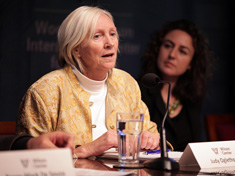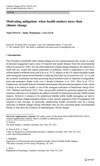-
Report: Damming of Lake Turkana Could Leave Thousands Without Water, Provoke Tribal Conflict
›The damming of a river that feeds the world’s largest desert lake could lead not only to less drinking water for thousands of Kenyans, but international conflict between tribes for what little water remains.
-
Judy Oglethorpe: Fighting Environmental Change in Nepal Through Community Empowerment
› -
The U.S. Military’s Role in Global Health; Motivating Behavioral Change Through Personal Health
› Climate change mitigation efforts are more broadly supported when they are framed as a public health issue, according to results recently published in Climatic Change. After polling U.S. participants with political identities ranging from very liberal to very conservative, authors Nada Petrovic, Jaime Madrigano, and Lisa Zaval found most participants, except those who identified as very conservative, believed “health” to be the most compelling reason to reduce fossil fuels.
Climate change mitigation efforts are more broadly supported when they are framed as a public health issue, according to results recently published in Climatic Change. After polling U.S. participants with political identities ranging from very liberal to very conservative, authors Nada Petrovic, Jaime Madrigano, and Lisa Zaval found most participants, except those who identified as very conservative, believed “health” to be the most compelling reason to reduce fossil fuels.
Showing posts by Linnea Bennett.






